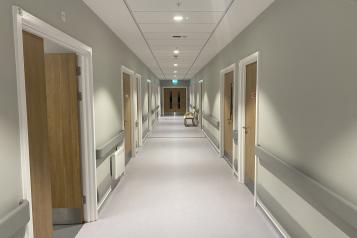NHS urged to do more to help patients leave hospital safely

Ahead of winter, when demand for services increases and when there is pressure on trusts to discharge patients as quickly as possible, Healthwatch have looked again at what people are telling us about leaving hospital.
What people told Healthwatch:
- they didn't feel ready to leave the hospital;
- they weren't asked if they needed transport to the place they were discharged to;
- they weren’t given contact information for further help or advice when leaving the hospital.
Current government guidance
The Government guidance on safe hospital discharge states:
- Hospital discharge teams should ensure people have transport to return home or move to another facility. Staff makes arrangements to ensure there is transport for people to return home from the hospital, via family or carers where appropriate or suitable, voluntary sector, or taxi and, only as a last resort, non-emergency patient transport services (NEPTS).
- Health and social care professionals should give ‘safety netting’ information on discharge, including the contact details of their discharge team for people leaving the hospital as well as their carers.
However, our new research suggests that many people leave the hospital without the right support or information, or are not always asked if they need transport to get to the place they are discharged to.
Healthwatch Research
Following work with the British Red Cross in 2020, Healthwatch conducted a survey this autumn to learn about people’s recent experiences of hospital discharge. 583 people (including 175 carers) who have been through the hospital discharge process in the past 12 months, took part.
Key findings
- Over half, 59%, of people said the hospital discharge team didn't ask if they needed support in getting transport to the place they were discharged to, contrary to government guidance
- People discharged either in the early hours, before 9 am, or late, after 6 pm, were significantly less likely to be asked if they needed transport.
- Over half, 51%, of people weren’t given contact information for further help or advice when leaving the hospital, contrary to government guidance
- Nearly a third, 32%, felt unprepared at discharge.
- Carers were more likely than patients to say they didn't feel prepared at discharge (44% of carers, 25% of patients).
- Over one in ten, 11%, had to wait over 12 hours after being told they were well enough to leave the hospital.
- Over one in five, 24% reported an excellent hospital discharge experience, with 37% reporting either a mixed or neutral experience.
Healthwatch are calling for:
- The Government to update its hospital discharge and community support guidance. It must include new minimum standards on transport waiting times and post-discharge contact times.
- Integrated Care Boards (ICBs) to be consistent in implementing the latest hospital discharge guidance, including:
- Supporting people to make informed choices by providing contact information and advice and asking about transport home;
- Better signposting to support services, including voluntary organisations and services that support unpaid carers;
- Dedicated staff who will make travel arrangements;
- Points of contact for people to use if their condition gets worse;
- Greater involvement of family and carers in decisions about people discharge.
- Urgent government reform of the social care system to ensure councils and providers have the staff, skills, and resources to support people to live independently, including reablement support at home or in residential care following discharge from the hospital.
- ICBs to focus on workforce solutions in secondary care, including a review of staff retention policies and the development of plans to increase the capacity of administrative staff in local NHS trusts. Admin staff should act as points of contact for those coming into and leaving the hospital and support the work of 'transfer of care' hubs
- NHS Digital to capture and report data on deterioration in health at seven and 30 days after discharge, to understand where discharge processes are not always working for patients. This includes collecting data on emergency readmissions, death after discharge, and contact with another health service about the same condition.
Key themes in the research
In addition to the questionnaire, which provided us with the above data, we analysed more detailed stories from 430 people, shared either through our webform or a local Healthwatch branch. The stories helped us identify the following themes:
- When hospital discharge works well
- Delays to leaving hospital
- Leaving hospital
- Leaving at the right time
- Transport arrangements
- Ongoing support
When hospital discharge works well
People were significantly more likely to report a good experience if they:
- Felt prepared for the discharge process.
- Were given information about who to contact if they had any further questions.
- Were discharged between 9am-6pm.
- Were offered support in arranging transport.
- Had a discharge assessment.
- Carers and loved ones were involved.
Healthwatch Calls for Change
Health and care leaders must see hospital discharge in the context of the whole health and social care system.
The Government should provide additional resources to support NHS and social care teams to ensure discharge procedures are closely followed, even during times of pressure. People tell us that when this doesn't happen, they require readmission or turn to other services, such as GPs, for support.
Local work on Hospital Discharge.
Healthwatch Halton and Healthwatch Warrington are working together to find out about people’s experience of hospital discharge, following national reports on the subject indicating some of the current challenges.
The current ‘Discharge to Assess’ model introduced in 2020 aims to ensure that people are discharged to the right place with the right support at the right time without unnecessary waits for care assessments whilst in hospital. However, we know that this doesn’t always happen because of current challenges in the health and care system.
If you, or someone you care for, has been discharged from an inpatient stay in hospital during the past 12 months, we'd like to hear your views. It is key that as we move forward, people’s experiences both during discharge and after leaving hospital are at the centre of plans to get things right.

